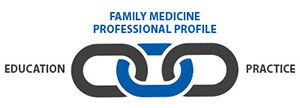Family Medicine Professional Profile
Why Was The Profile Developed?
Standard setting:
To guide the development of educational standards with a clear description of the work of family physicians in keeping with a competency-based medical education (CBME) paradigm.
Social accountability:
To describe the collective commitment of family physicians to the people of Canada. To articulate the contribution of generalists and generalism in family medicine, introducing the concept of community-adaptiveness.
Communication:
To better inform others (partner organizations, policy-makers) about the role and scope of family physicians and to guide our messages to medical students about family medicine as a career.

The Family Medicine Professional Profile is a position statement that defines the discipline of family medicine, describes the scope of practice and training for family physicians, and highlights our philosophy of care.
The Family Medicine Professional Profile is the College of Family Physicians of Canada (CFPC) position statement for the discipline of family medicine. It communicates the collective contributions, capabilities, and commitments of family physicians to the people of Canada.
Primary Responsibilities
Working together, family physicians provide a system of front-line health care that is accessible, high-quality, comprehensive, and continuous. Individually they take responsibility for the overarching and proactive medical care of patients, ensuring follow-up and facilitating transitions of care and/or referrals when required.
More than a series of tasks, it is through relational continuity and a commitment to a broad scope of practice that the complexity of care is meaningfully addressed. The care family physicians provide improves the overall health of the population. The principal aims of the CFPC are to set educational standards for family physicians and to develop, support, and sustain family physicians in the provision of:
- Comprehensive medical care for all people, ages, life stages, and presentations. This care includes all clinical domains, both acute and chronic, and all stages, from preventive to palliative care. Family physicians work across care settings and regulatory environments, including:
- Primary care
- Emergency care
- Home and long-term care
- Hospital care
- Maternal and newborn care
- Leadership at all levels for accessible, high-quality, comprehensive, and continuous first-contact health care that responds to local conditions, and for research that advances an understanding of this care.
- Advocacy for access to culturally safe, affordable, high-quality, and comprehensive health care, along with the social conditions that promote health. This requires outreach and engagement, such as working with community partners and including patients experiencing hardship and/or barriers to care.
- Scholarship (teaching/quality improvement (QI)/research) as reflected in practice-based QI activities, an evidence-informed approach to care, and in the roles of teacher and mentor. Family physicians advance the knowledge of the discipline through a continuum of research activities.
Work Settings And Arrangements
Family practices are a cornerstone of the Canadian health care system, functioning as hubs of access and coordination. Family physicians commonly work in teams, and the CFPC advocates for the uptake and support of the Patient’s Medical Home model as a means of achieving accessibility, comprehensiveness, and continuity in a way that is both personally and professionally sustainable.
Family physicians collaborate and share an interdependence with other health care professionals, contributing medical expertise in clinical care and leadership to ensure practice quality and continuous improvement. Family physicians with enhanced skills work in collaborative arrangements, where possible, to extend the comprehensiveness of care provided locally while supporting continuity and sustainability and leading improvements in education and the adoption of models of care that support this integration.
Special Features And Contributions
All family physicians, regardless of the nature of their practices, embody a characteristic approach that strengthens the compassion, responsiveness, integrity, and quality of the health care system. This approach drives the provision of care that is:
